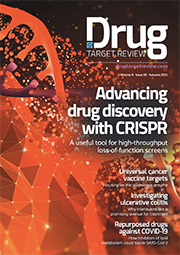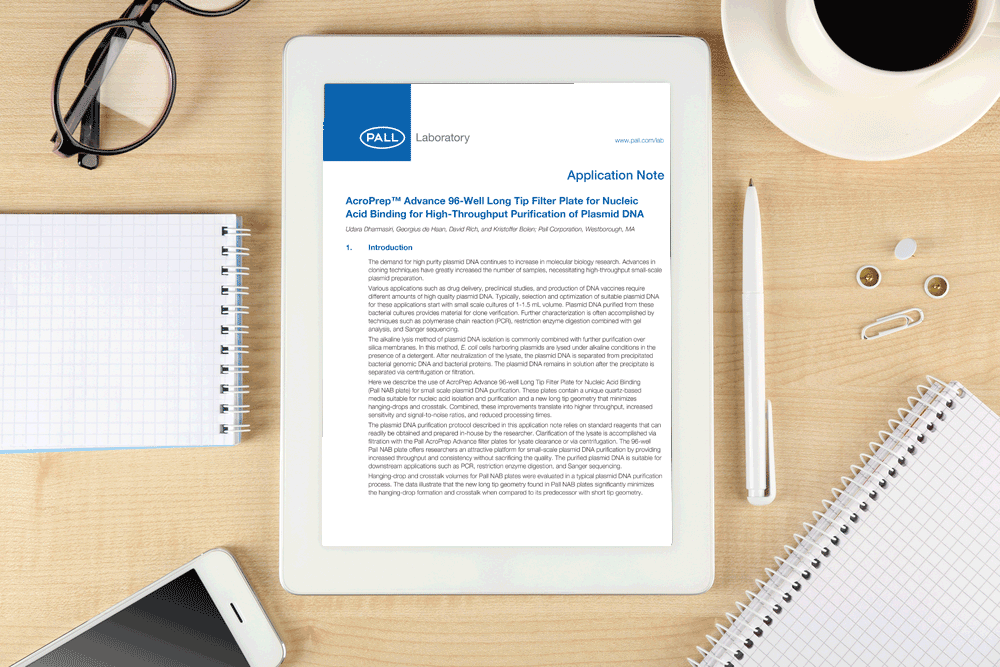App note: AcroPrep™ Advance 96-well Long Tip Filter Plate for Nucleic Acid Binding for high-throughput purification of plasmid DNA
Posted: 22 November 2016 | Pall Laboratory | No comments yet
In this application note, Pall Laboratory describe the use of AcroPrep Advance 96-well Long Tip Filter Plate for Nucleic Acid Binding…
The demand for high purity plasmid DNA continues to increase in molecular biology research. Advances in cloning techniques have greatly increased the number of samples, necessitating high-throughput small-scale plasmid preparation.
Various applications such as drug delivery, preclinical studies, and production of DNA vaccines require different amounts of high quality plasmid DNA. Typically, selection and optimization of suitable plasmid DNA for these applications start with small scale cultures of 1-1.5 mL volume. Plasmid DNA purified from these bacterial cultures provides material for clone verification. Further characterization is often accomplished by techniques such as polymerase chain reaction (PCR), restriction enzyme digestion combined with gel analysis, and Sanger sequencing.
The alkaline lysis method of plasmid DNA isolation is commonly combined with further purification over silica membranes. In this method, E. coli cells harboring plasmids are lysed under alkaline conditions in the presence of a detergent. After neutralization of the lysate, the plasmid DNA is separated from precipitated bacterial genomic DNA and bacterial proteins. The plasmid DNA remains in solution after the precipitate is separated via centrifugation or filtration.
Here we describe the use of AcroPrep Advance 96-well Long Tip Filter Plate for Nucleic Acid Binding (Pall NAB plate) for small scale plasmid DNA purification. These plates contain a unique quartz-based media suitable for nucleic acid isolation and purification and a new long tip geometry that minimizes hanging-drops and crosstalk. Combined, these improvements translate into higher throughput, increased sensitivity and signal-to-noise ratios, and reduced processing times.
The plasmid DNA purification protocol described in this application note relies on standard reagents that can readily be obtained and prepared in-house by the researcher. Clarification of the lysate is accomplished via filtration with the Pall AcroPrep Advance filter plates for lysate clearance or via centrifugation. The 96-well Pall NAB plate offers researchers an attractive platform for small-scale plasmid DNA purification by providing increased throughput and consistency without sacrificing the quality. The purified plasmid DNA is suitable for downstream applications such as PCR, restriction enzyme digestion, and Sanger sequencing.
Hanging-drop and crosstalk volumes for Pall NAB plates were evaluated in a typical plasmid DNA purification process. The data illustrate that the new long tip geometry found in Pall NAB plates significantly minimizes the hanging-drop formation and crosstalk when compared to its predecessor with short tip geometry.
This application note is restricted - login or subscribe free to access


Why subscribe? Join our growing community of thousands of industry professionals and gain access to:
- quarterly issues in print and/or digital format
- case studies, whitepapers, webinars and industry-leading content
- breaking news and features
- our extensive online archive of thousands of articles and years of past issues
- ...And it's all free!
Click here to Subscribe today Login here
Related content from this organisation
- Pall Laboratory
- App note: Evaluation of RNA isolation efficiency of Pall AcroPrep™ Advance 96-Well Long Tip Filter Plate for Nucleic Acid Binding
- App note: AcroPrep™ Advance 96-well Long Tip Filter Plate for Nucleic Acid Binding for high-throughput purification of plasmid DNA
- App note: Evaluation of Genomic DNA isolation with AcroPrep™ Advance 96-Well Long Tip Filter Plate for Nucleic Acid Binding
- Whitepaper: Single-tube DNA purification and cloning using ultrafiltration devices
Related topics
High Throughput Screening (HTS)
Related organisations
Pall Laboratory





